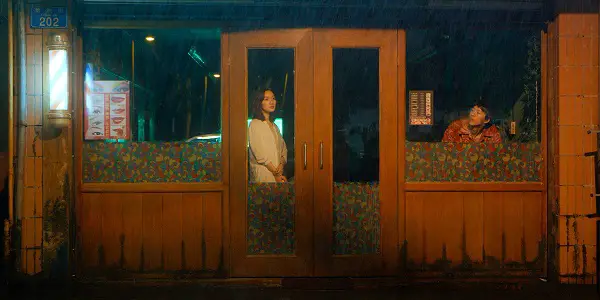Following in the nocturnal, neon-lit footsteps of such films as Wong Kar-wai’s Fallen Angels, Hou Hsiao-hsien’s Millennium Mambo, and Lou Ye’s Suzhou River is Na Jiazuo’s Streetwise. The film, which screened in the Un Certain Regard section of the 2021 Cannes Film Festival, follows an aspiring debt collector as he tries to avoid following in the footsteps of his ex-gangster father while still earning enough money to keep his dying elder alive. Set in the Sichuan Province city of Zhenwu in the early 2000s — a place full of eerily empty streets that have been abandoned for those in bigger and better cities — Streetwise makes up for its lack of a truly compelling story with a spellbinding aesthetic that should hold your attention regardless.
Mean Streets
Dong Zi (Li Jiuxiao) works as the muscle behind Xu Jun (Yu Ailei), a past-his-prime debt collector with a distinctive limp and a penchant for pocketing large sums of his boss’ money so that he can treat his longtime girlfriend right. (So many people have left Zhenwu for better opportunities that it’s almost too easy for Zu Jun to just claim the debtors cannot be found.) When Dong Zi isn’t learning the ropes from his oddball mentor, he’s hanging out in the tattoo parlor owned by Jiu’ er (Huang Miyi), a former gangster’s moll who dreams of fleeing Zhenwu herself; Dong Zi puts her on a pedestal as a romantic idol, but she sees him as more of a lovable little brother.

Dong Zi claims in voiceover that the only reason he’s working as a debt collector-in-training is to raise money to pay for his father’s substantial medical bills. His dad (Qi Zhi), once an infamous gangster himself, is now confined to a hospital bed…that is, when he isn’t sneaking out to sublet his apartment to lovers looking for a trysting place and engaging in all kinds of other borderline-criminal shenanigans. The relationship between father and son seems bereft of true affection, yet that doesn’t stop Dong Zi from doing whatever it takes to keep the old man alive.
Rebels of the Neon God
The world of Streetwise is rich with surreal, sinister beauty courtesy of cinematographer Li Jianeng. During the day, the streets of Zhenwu are often the site of noisy, violent disputes, while at night they are simply left empty, with the haunting glow of neon light emanating from the few shops that haven’t been permanently shuttered; in such a rundown world, Jiu’er’s admittedly second-rate tattoo shop shines out into the night like an oasis, offering Dong Zi the care and companionship he cannot find anywhere else. In one particularly beautiful shot, two characters speak (and fight) on a footbridge stretched between two buildings; the twisted towers of the slums surrounding them, crumbling in disrepair, are almost reminiscent of a labyrinth from a fairy tale. Yet there’s no happily ever after for anyone in Streetwise; despite Na dedicating his film to all in need of comfort, there is little of that feeling to be found here.
The main problem with Streetwise is that the most compelling characters — the enigmatic Jiu’er and Dong Zi’s irrepressible father—don’t have enough screen time; when they’re in scenes, they steal them, but when they’re not, it’s easy to grow bored. The character of Dong Zi has been seen before (with slight variations) in many other Chinese neo-noirs; he’s familiar and almost relatable, but that doesn’t make him an exciting protagonist to follow. Much of his voiceover involves him mooning over Jiu’er, and while much of the dialogue is beautifully written, it can grow repetitive — especially when you’d rather just see him in a scene with her, attempting to unravel her secrets. Still, when everything is as beautifully lit and framed in a film as it is here, you’ll find it hard to tear your eyes away from the screen regardless.
Conclusion:
A snapshot of small-town ennui with a hefty splash of neon-tinted noir, Streetwise has such an intoxicating atmosphere that you can almost forgive its narrative weaknesses. Na is clearly a rising talent — he even wrote the beautiful song that plays over the film’s end credits — so I look forward to seeing what he does next.
Streetwise opens at Metrograph in New York on July 21, 2023.
Does content like this matter to you?
Become a Member and support film journalism. Unlock access to all of Film Inquiry`s great articles. Join a community of like-minded readers who are passionate about cinema - get access to our private members Network, give back to independent filmmakers, and more.